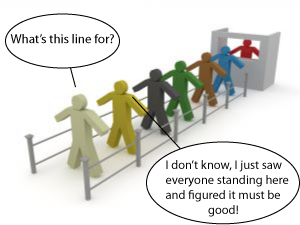Social proof is continuing to play an ever increasing role in determining how web pages are ranking in the major search engines like Google, Bing, and Yahoo. This post will answer what is social proof and explain why it is playing such a large role in SEO.
What is Social Proof?
Social proof is when the actions of others influence people to believe that those actions reflect correct behavior. This is especially apparent on the internet where social proof influences people to do all kinds of things.
An example of social proof in action is putting a counter on your site to reflect the number of newsletter sign ups which you have amassed. The larger the number, the more likely that subsequent visitors to your site will sign up after seeing that number. The assumption is that you have a great newsletter, otherwise why would so many people have signed up for it in the past? The larger and stronger the social proof, the greater the motivation to continue that trend.
Social proof is being used with greater frequency each day as you’ll find a counter next to all kinds of content to represent anything from number of tweets, Facebook “Likes”, “Diggs”, etc. The more something gets shared across various social networks, the better that content is perceived to be by those who see it and consequently the more likely it is to continue to be shared.
The other half of social proof is the influence which it is having on search engines. Google and other search engines use a large number of factors in their algorithms which they use to rank a web page in the SERPs. One of these factors is this proof which is continuing to play a more decisive role in determining how a page ranks.
The reasoning behind this makes sense. Google believes that the more “Likes” which a page has for example, then the better the quality of that page must be because people are unlikely to share information unless it is of high quality. Google is essentially letting internet users do its job for it in part as people are given the task to rate the content which they come across. Google looks at this rating and factors it in with the rest of its algorithm, then ranks that page accordingly.
Conversely, there is such a thing as “negative social proof” or a lack of it. When something has NOT been shared by many or by any people across social networks, that is an indication and leads to the assumption that this is not quality content, and the search engines as well as other people are more likely to turn their backs on content with negative social proof attached to it.
It’s no coincidence that Google’s Farmer Update occurred around the same time as social proof began to play a larger role in its algorithm. Google was tired of these content farms crowding up their search results with sub par and recycled content.
With this move to put it more in the driver’s seat, Google is almost saying to its users: “you want better content in the search results, you be the judge”; truthfully it’s a step in the right direction… that is until this inevitably becomes abused like everything else.
For more information, check out this post on what is social search to see the kinds of effects social networks are having on the SERPs.
